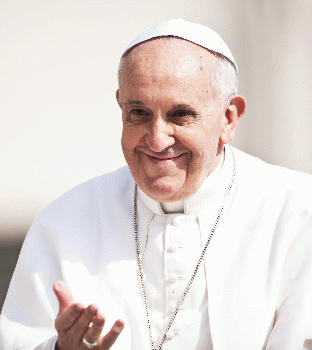
General Audience with Pope Francis
(Image by Catholic Church (England and Wales) from flickr) Details DMCA
Duluth, Minnesota (OpEdNews) July 14, 2021: The twentieth century was a nightmare: World War I, the Great Depression, World War II, the Holocaust, the bombing in Hiroshima and Nagasaki, the Cold War, the Korean War, the Vietnam War.
FRIEDRICH NIETZSCHE'S TESTIMONY
These various twentieth-century tragedies seem to call for a revaluation of the values of Western culture (to borrow the expression used by the nineteenth-century German classicist and philosopher Friedrich Nietzsche [1844-1900], the self-described atheist who announced the death of God - whatever that may have meant to him). Disclosure: I am not an atheist, but a theist.
In addition to calling for a revaluation of values, presumably along atheistic lines, or at least not along conventional Christian lines, the would-be anti-christ Nietzsche called for the emergence of the overman/overmen in philosophy, the arts, and politics to lead the trickle-down revaluation of values. Nietzsche fancied himself to be an overman in philosophy.
For the record, whatever else may be said about Nietzsche, he did not envision a bottom-up revaluation of values. (Nietzsche was decidedly misogynistic, so perhaps we should understand his use of the generic term overman/overmen to mean persons of the male gender.)
Now, whatever else may be said about Nietzsche's various writings, he did not write epic poetry, even though his prose writing style is poetic. Nevertheless, I want to mention here that American Jesuit Renaissance specialist and cultural historian Maurice B. McNamee's compendious book Honor and the Epic Hero: A Study of the Shifting Concept of Magnanimity in Philosophy and Epic Poetry (New York: Holt, Rinehart and Winston, 1960). McNamee's use of the Latinate term "Magnanimity" refers to what Aristotle refers to as the great-souled person.
In any event, Nietzsche fashioned his own concept of the great-souled person(s) in his concept of the overman. However, taking a hint from what McNamee refers to as "the Shifting Concept of Magnanimity in Philosophy," I am here suggesting that all canonized saints in the Roman Catholic Church represent magnanimity - in short, they are examples of great-souled persons.
For a book of related interest, see Robert Faulkner's The Case for Greatness: Honorable Ambition and Its Critics (Yale University Press, 2008).
Ah, can a case for greatness be made for persons at the bottom - in a bottom-up approach to the revaluation of values (in Nietzsche's terminology)? No doubt persons at the bottom can aspire to be great-souled persons (in Aristotle's terminology). However, beyond one's own personal experience of a revaluation of values in one's own life, the more far-reaching revaluation of values that Nietzsche envisioned would necessarily have to involve far more than one's own personal experience to the revaluation of one's own values. Consequently, even in a bottom-up model, the more far-reaching revaluation of values would have to involve multiple inputs by many great-souled individual persons - in a larger collective effort characterized by what Erik H. Erikson refers to as generativity.
Now, Nietzsche links the emergence of what he refers to as the will to power in the human person's psyche/soul as signifying the emergence of the overman/overmen, the person(s) who will presumably somehow spearhead the revaluation of values not only in themselves but also in others in the presumably cascading top-down revaluation of values in philosophy, the arts, and politics.
Even though Alfred Adler (1870-1937) also used the expression will to power, I am not sure that canonized saints in the Roman Catholic Church would have used Nietzsche's and Adler's expression to refer to a comparable subjective experience in their psyches. Most likely, canonized saints would have thought of such a comparable subjective experience in their psyches as arising from the grace of God in their lives.
Nietzsche's expression will to power can produce the unfortunate impression that one can experience what Nietzsche experienced as the will to power simply by engaging one's will and willpower, if you will forgive my play on words here. Granted, one is not likely to experience what Nietzsche experienced as the will to power without engaging one own will and willpower.
(Note: You can view every article as one long page if you sign up as an Advocate Member, or higher).




